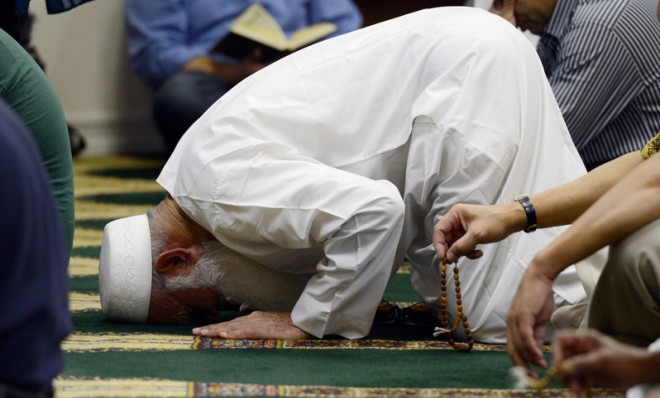The insanity of blaming Islam


A free daily email with the biggest news stories of the day – and the best features from TheWeek.com
You are now subscribed
Your newsletter sign-up was successful
We are still speculating about virtually everything right now, but I feel as though I need to explain why I find the quick and easy conversation about Muslims being radicalized in America to be so illogical and laced with bigotry.
Of course, there is a global violent jihadist movement, loosely organized, that wants to recruit young men to influence policies at home and abroad and perhaps usher in the global caliphate. That ideology motivates some Muslims to kill innocent people.
But you're allowed to be a radical Muslim in America. You're allowed to believe that the Qu'ran proscribes the most elegant set of laws. You're allowed to believe that one man's terrorist is another man's freedom fighter. And you can say, in America, pretty much anything you want. Not everything, and after 9/11, a little less, but you can still make very unpopular arguments.
The Week
Escape your echo chamber. Get the facts behind the news, plus analysis from multiple perspectives.

Sign up for The Week's Free Newsletters
From our morning news briefing to a weekly Good News Newsletter, get the best of The Week delivered directly to your inbox.
From our morning news briefing to a weekly Good News Newsletter, get the best of The Week delivered directly to your inbox.
So just for the sake of argument, let's assume that the only factor that motivated these two brothers from Chechnya to set off bombs and kill police officers is their decision to accept some form of radical Islamic teachings as their foundational belief system. (I highly doubt this is the case, but let's just throw it out there.)
We ask: "We have to look at the whole issue of radicalization. What prompts someone raised as an American to cause such carnage?"
That's what Peter King, the Republican chair of the Homeland Security committee, asked. So he goes right to the religion; somehow, he slides very quickly past the possibility that something about America is radicalizing people of all sorts.
He commits the sin of essentialism.
A free daily email with the biggest news stories of the day – and the best features from TheWeek.com
It's a horrible habit: A Korean-American shoots fellow students at Virginia Tech, and suddenly, we're forced to pretend that it's OK to blame Korean-American family structure and culture for putting him over the edge, ignoring the millions of Korean-Americans who have never considered taking up arms.
The murderer Andrew Cunanan was, in Tom Brokaw's famous words, a "homicidal homosexual."
See? The gay made him do it.
But when a white kid murders dozens of children, we don't ask whether the predominant Christian religion in America somehow radicalized him, or whether his upbringing was somehow less American than anyone else's. Stupid questions! Glad we don't ask them.
It is far more plausible that American gun culture, the way that Americans are uncomfortable with people who are different, the gaps in the mental heath system, and a hundred other things, some of which cannot ever be controlled, pushed these two men over the edge. If it was Islam, or a hidden network of radical jihadists, then these types of events would not be rare in America. That they are is the answer to whether Islamic radicalization is a problem that Americans can and must contend with by stigmatizing Muslims.
What is it about America that so alienates young men?
What is it about their community — Cambridge, lower-middle class, American popular culture — that isolated them and encouraged their pursuit of a different way to add meaning to their lives?
Here's the thing: We won't really ever know. We rightfully seek closure and answers, but we ought to come to grips with the reality that violence against random others is often a conspiracy of the mind.
I love American culture, and I also think that something about living in a modern society loosens the moorings that prevent us from acting on our deepest, ugliest thoughts. Maybe in America it's a combination of economic distress, mass media, access to guns, bias and prejudice; maybe elsewhere it's the decline of ordering institutions like the church.
The two suspects were Cantabrigians before they were Chechens. They were Americans before they Chechens. They were Americans; one was apparently a Muslim who had found a lovely girlfriend and never seemed to find that his religion was incompatible with whatever "normal" America is supposed to be.
Bias against Muslims is real and it hurts. And the easiest way to radicalize un-radicalized people is to treat them like enemies.
Marc Ambinder is TheWeek.com's editor-at-large. He is the author, with D.B. Grady, of The Command and Deep State: Inside the Government Secrecy Industry. Marc is also a contributing editor for The Atlantic and GQ. Formerly, he served as White House correspondent for National Journal, chief political consultant for CBS News, and politics editor at The Atlantic. Marc is a 2001 graduate of Harvard. He is married to Michael Park, a corporate strategy consultant, and lives in Los Angeles.
-
 How the FCC’s ‘equal time’ rule works
How the FCC’s ‘equal time’ rule worksIn the Spotlight The law is at the heart of the Colbert-CBS conflict
-
 What is the endgame in the DHS shutdown?
What is the endgame in the DHS shutdown?Today’s Big Question Democrats want to rein in ICE’s immigration crackdown
-
 ‘Poor time management isn’t just an inconvenience’
‘Poor time management isn’t just an inconvenience’Instant Opinion Opinion, comment and editorials of the day
